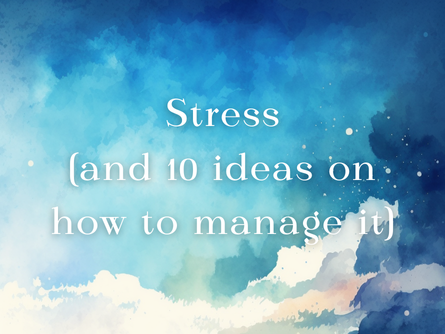Stress (and 10 ideas on how to manage it)

Hello my friend, how are you?
This week the theme that has come up over and over again is stress. It has come up in so many conversations with clients, students and friends this week, I've taken it as a hint to talk about it in this week's blog post.
🌿 Not all stress is bad
Stress is our body’s natural response to challenges and it can serve us in certain situations. Now and again stress can prove useful but it should not be our resting state.
🤒 Stress and dis-ease
Our bodies are absolutely incredible but they were not made to experience stress consistently over an extended period of time.
If we do experience stress consistently, it can often start to manifest in the body through illness and disease (dis-ease - as in 'not at ease').
💪 Fight or flight
When we were cave people and happened to come across a sabre-toothed tiger, stress was incredibly helpful for us.
It activated our sympathetic nervous system and put us in fight or flight mode, pumping adrenaline, increasing our heart rate, raising our blood pressure and diverting blood and energy away non-essential functions like digestion into our limbs and muscles to allow us to either fight the tiger or run like the wind in the opposite direction!
🧘♀️ Rest and digest
Once we got somewhere safe again, we would move out of stress - or fight or flight - and into 'rest and digest.'
Rest and digest is where the system calms down and the parasympathetic nervous system is activated. It moves energy back to the organs, giving them the blood flow they need to function properly. This state promotes digestion and cognitive functions that were temporarily sidelined during the stress response.
Our heart rate slows, our blood pressure goes down and good hormones get released. We're back in a state of ease and the energy goes where it's needed for the body to function properly and to allow it to heal and repair.
🔭 Narrow focus
Another effect of stress is that it narrows our focus and makes us more prone to impulsive thinking. When you're face to face with a sabre-toothed tiger, it makes sense that all of your attention is now focused on the current and most pressing problem: the tiger and on how you can get away from it as quickly as possible!
When you're safe again, you can go back to thinking about your next meal or appreciating your surroundings, but in the moment, it serves you well to be laser focussed on the issue at hand.
🐯 Modern day tigers
These days we don't encounter tigers very often, but we do encounter situations (and people!) that trigger a similar stress response in the body and mind without any real physical danger.
Our minds are so powerful that we can conjure up a feeling of stress, even when we are safe and warm in our bed or snuggled on the sofa.
The thing is, as we've just seen, stress is not just a feeling. It is a physiological response. When we start to spend more and more time in this stressful state, without any healthy outlets, it begins to negatively affect our physical health.
The body knows how to heal itself, but the environment must be right for it to do so.
😇 10 ideas for how to manage stress
So, how can we manage stress effectively?
Here are ten ideas:
- Mindful breathing: Take a few minutes each day to breathe deeply and focus on your breath. Inhale positivity; exhale negativity! Box breath and 4,7,8 breathing in particular are incredibly effective.
- Physical activity: Whether it’s a brisk walk or an impromptu dance party in your living room, moving your body helps release built-up tension.
- Limit exposure: If certain people or situations trigger your stress response more than others, try limiting exposure and setting boundaries.
- Connect with others: Sometimes just talking about what’s stressing you out can help lighten the load.
- Reiki: The most common feedback I get from clients after a Reiki session is that they feel 'relaxed' and 'lighter.' It's the best way I know of to create the environment for the body to heal itself.
- Sound healing: Sound baths are a wonderful way to relax and de-stress. The frequencies emitted during a session can entrain brainwaves into more relaxed states.
- Yoga: Regular yoga practice improves breathing, resilience, strength, and flexibility while cultivating the ability to decrease the fight-or-flight response. I just love it!
- Nutrition: Avoiding stimulants like caffeine and sugar while maintaining a balanced diet can support parasympathetic activation.
- Rest: Always always always listen to your body. It will tell you what you need and when you need it. When it tells you it needs to rest. Listen to it!
- Gratitude journaling: Shift your focus from what’s stressing you out to what you’re thankful for. Perspective is everything - it’s hard to worry about tigers when you’re busy counting your blessings!
By consciously redirecting your focus away from stressors and toward positivity and healing, you can begin to shift your reality.
Always remember, what you focus on GROWS!
Have a wonderful day,
Amy 💜🤟
Reiki | Sound | Coaching
✨1:1 Reiki sessions - experience Reiki for yourself!
✨Reiki courses & workshops - learn how to use Reiki for self-healing and to help loved ones and pets
✨Sound healing & sound bath experiences - experience Reiki mixed with sound for a profoundly relaxing and restorative experience.
✨1:1 & group life coaching sessions - uncover limiting beliefs, set meaningful goals, and take aligned, empowered action to create the life you truly want. Fly high; I'm here to help.
If you liked this post, you may also enjoy: